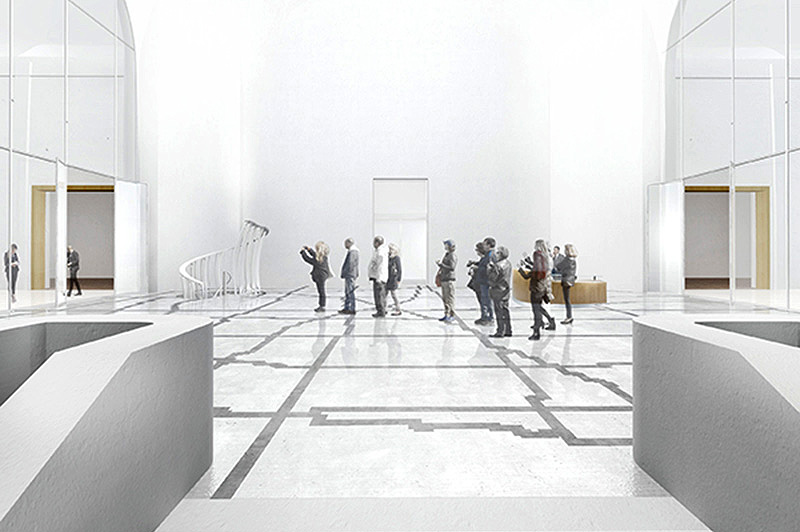hoch und tief, grad und schief

Competition, Ministry for Family Affairs, Mauerstr.27, Berlin
“… weil die Menschen von Natur her nicht gleich sind und daher einer von Menschen errichteten Einrichtung bedürfen, der Polis um Kraft des Gesetzes einander ebenbürtig zu werden. Gleichheit existierte nur in diesem spezifisch politischen Bereich wo die Einwohner der Polis als Bürger und nicht als Privatpersonen zusammenkamen.“ (Hannah Arendt, About Revolution, Munich, Piper 1974 p. 36)
But if a community experiences itself as fundamentally predetermined, it loses its character as a project to be shaped politically, its utopian energies and resources seem exhausted and the horizon of expectations shrinks. How can I, as an actor, work towards a fundamental change in what already exists if my imagination is generated by the social structures that I want to change and if my actions are limited by these structures?
The opening of spaces in which the contradiction between politics and economy, past and present, universal and particular, success and failure form a charged field of tension in which the conflicts between institutions, discourses, social and political practices are only put in tension with each other. Only by accepting their diverse polarities and contradictions their potential can be communicated and the scope between them expanded.
We want to create a space in which the dynamics of order and the formless power of change can be seen and felt at the same time. The white, geometrically illuminated and ordered room is currently being built. We see our task in putting the spatial order in a state of tension through discontinuous moments. To open the order and imagination horizon for the imaginary dimension of our will, desire and desire and not to close it again immediately. With our work, which consists of breakthroughs to historical deposits and open spatial structures, we give a place to the repressed shadows and formless forces, which are blocked from the direct path in the static order. This does not replace the previous order, but rather transforms it, transforms it and puts it up for discussion. The formal language introduced by us makes deviations, detours, irregularities, as well as chance and failure visible as constitutive elements of our history and reality. No order is static, it depends on its own repetition and reinstatement. This in turn opens its seemingly closed structure and offers starting points for transformation.
Entwurf und Unterstützung von studio c/o now






